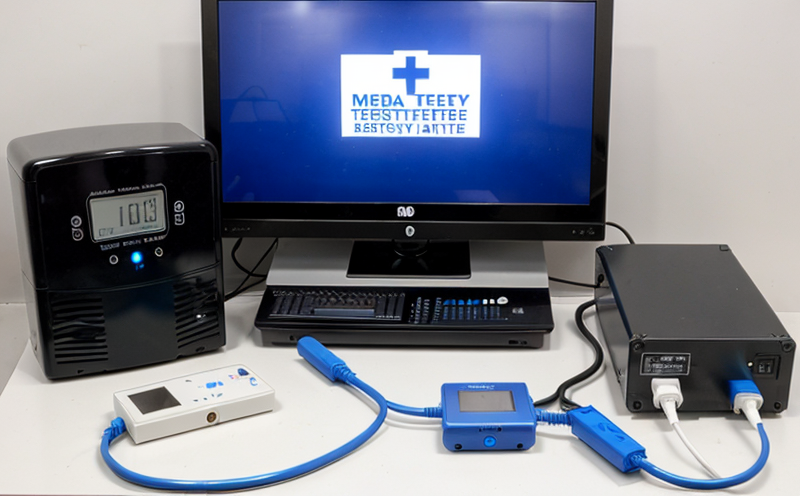ISO 13485 Medical Device Quality Management Battery Testing
The International Organization for Standardization (ISO) has established ISO 13485 as a quality management system specifically designed for medical device manufacturers. This standard ensures that the processes, practices, and systems used in the design, development, production, control, inspection, and release of products are effective and meet regulatory requirements.
Medical devices rely heavily on batteries to function effectively, especially those used in critical applications such as implantable cardiac monitors or portable dialysis machines. Ensuring that these batteries perform reliably is crucial for patient safety and compliance with international regulations. Eurolab's ISO 13485 battery testing service ensures that medical device manufacturers meet the stringent requirements of this standard.
The service involves a comprehensive approach to battery testing, encompassing design verification, production validation, and post-production monitoring. This includes both electrical performance tests (such as capacity, internal resistance) and mechanical stress tests under various operating conditions. The goal is to guarantee that batteries will operate within the required specifications throughout their lifecycle.
Our team of experts uses state-of-the-art equipment and follows strict protocols to ensure accurate and reliable test results. We employ a combination of manual testing methods and automated systems, tailored specifically for battery performance evaluation in medical devices. This approach ensures consistent quality across batches while adhering strictly to ISO 13485 guidelines.
For instance, when conducting capacity tests, we use high-precision discharge equipment capable of simulating real-world usage scenarios. These tests are conducted at different temperatures and humidity levels to assess how the battery behaves under diverse environmental conditions. Similarly, internal resistance measurements provide insights into the battery's health, which is critical for long-term performance prediction.
The service also includes electrochemical impedance spectroscopy (EIS), a technique that helps determine the condition of the electrolyte within the cell by measuring the reactance and resistance changes over frequency ranges. This method is particularly useful in identifying degradation patterns early on, allowing manufacturers to address potential issues before they become critical.
Moreover, our testing covers safety aspects such as overcharge protection, short circuit currents, and thermal stability tests. These ensure that batteries not only perform well but also meet stringent safety standards set by regulatory bodies worldwide. Compliance with these standards is essential for minimizing risks associated with product failure or malfunction.
In summary, Eurolab's ISO 13485 battery testing service provides a holistic solution aimed at ensuring the reliability and safety of medical device batteries. By adhering to this internationally recognized standard, manufacturers can enhance their reputation among healthcare providers and patients alike while complying with global regulatory expectations.
Industry Applications
- Pacemakers: Ensuring reliable power supply for vital cardiac functions.
- Dialysis Machines: Maintaining consistent performance during treatment sessions.
- Blood Glucose Monitors: Providing accurate readings even under varying environmental conditions.
- Implantable Cardioverter-Defibrillators (ICDs): Guaranteeing continuous operation during critical medical interventions.
- Negative Pressure Wound Therapy Devices: Sustaining stable power output for effective healing processes.
- Oxygen Saturation Monitors: Delivering precise measurements consistently across different patient groups.
- Diagnostic Imaging Equipment: Supporting continuous operation during complex procedures.
Beyond these examples, the application of ISO 13485 battery testing extends to virtually any medical device requiring reliable power sources. The reliability and safety ensured by this service play a pivotal role in maintaining high standards across diverse healthcare settings.
Eurolab Advantages
Comprehensive Expertise: Our team comprises industry veterans with extensive experience in medical device battery testing. They stay updated on the latest trends and advancements, ensuring that our services remain cutting-edge.
State-of-the-Art Facilities: Equipped with advanced instrumentation capable of simulating real-world conditions, providing precise and reliable test results.
Regulatory Compliance: Eurolab adheres strictly to ISO 13485 requirements, offering a seamless path towards certification and compliance for our clients.
Dedicated Support: Our clients receive personalized attention throughout the testing process, from initial consultation through final reporting. This ensures that every aspect of the service aligns with their unique needs and objectives.
Consistency in Results: By employing standardized procedures and rigorous quality control measures, we maintain high levels of consistency across all tests conducted.
Confidentiality Assurance: We understand the importance of maintaining confidentiality regarding proprietary information. Therefore, all data collected during testing is handled securely and respectfully.
International Acceptance and Recognition
The ISO 13485 standard enjoys widespread acceptance globally due to its rigorous approach to quality management systems in medical devices. Many regulatory authorities around the world recognize this standard, including the US Food and Drug Administration (FDA), European Medicines Agency (EMA), and others.
By adhering to these standards, manufacturers can ensure that their products meet not only local but also international requirements. This opens up opportunities for exporting goods into various markets without encountering significant obstacles related to certification or compliance issues.
The widespread adoption of ISO 13485 reflects the growing emphasis on patient safety and product quality within the medical device industry. As regulatory frameworks become more stringent, following this standard becomes increasingly important for maintaining competitive advantage in this sector.





